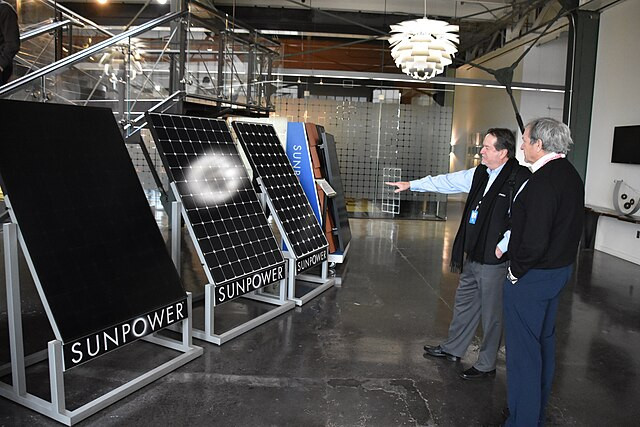In a significant blow to the residential solar industry, SunPower Corp., a prominent name in U.S. solar energy, has filed for Chapter 11 bankruptcy protection. The rooftop solar installer, known for its high-efficiency panels and widespread residential installations, cited high interest rates, allegations of financial misconduct, and a general decline in demand as key factors in its downfall.
SunPower's stock plummeted 32% to 55 cents per share on Tuesday, continuing a downward spiral that has seen its value drop nearly 90% this year. The company listed its assets and liabilities between $1 billion and $10 billion in its bankruptcy filing in the U.S. Bankruptcy Court for the District of Delaware.
The company is in the process of selling its Blue Raven Solar unit and new homes businesses, along with its non-installing dealer network, to Complete Solaria for $45 million, pending court approval. SunPower has requested the court to finalize the sale by mid-September. "The proposed transaction offers a significant opportunity for key parts of our business to continue our legacy under new ownership," said Tom Werner, SunPower's executive chairman, in a statement.
SunPower plans to liquidate its remaining assets through the bankruptcy process, following a severe liquidity crisis exacerbated by a sharp decline in demand in the solar market. Matthew Henry, the company's chief transformation officer, noted in a bankruptcy filing, "SunPower has faced a severe liquidity crisis caused by a sharp decline in demand in the solar market and SunPower's inability to obtain new capital."
The residential solar sector has been hit hard by high interest rates, which have dampened consumer demand and left companies with excess inventory. However, SunPower's issues extend beyond market conditions. The company has been under scrutiny for its financial reporting practices, leading to a U.S. Securities and Exchange Commission (SEC) subpoena in February. The SEC is investigating SunPower's revenue recognition practices in its quarterly reports from 2023.
In a further blow to the company's credibility, SunPower's independent accountant, Ernst & Young, resigned in June, citing allegations of misconduct by senior management related to the company's financial statements. This resignation followed SunPower's admission in December that it had breached a credit agreement and warned of "substantial doubt" about its ability to continue operating.
SunPower's financial troubles are compounded by a broader industry slowdown. High interest rates and changes in California's solar subsidies, the largest U.S. market for solar energy, have created headwinds for companies expecting growth from President Joe Biden's 2022 climate law. "SunPower's travails are emphatically a company-specific issue and should not be seen as a comment on the underlying demand for U.S. residential solar," said Pavel Molchanov, an analyst with Raymond James.
Founded in 1985, SunPower once enjoyed a reputation for producing some of the best solar panels in the industry. However, the company spun off its manufacturing operations in 2020 to focus on the burgeoning demand for rooftop installations, a bet that soon unraveled as inflation and high interest rates boosted consumer costs.
In recent months, SunPower has taken drastic measures to cut costs and restructure its operations, including firing workers, restating earnings, and replacing its chief executive officer. Despite these efforts, the company has struggled with long-term debt, defaulted on a credit agreement, and lost its accountant.
Complete Solaria, the stalking horse bidder for SunPower's assets, is led by CEO T.J. Rodgers, a veteran Silicon Valley executive and early SunPower backer who served as the company's chairman from 2005 to 2011. The sale of SunPower's assets to Complete Solaria marks the beginning of the end for a company that once led the U.S. solar industry.





